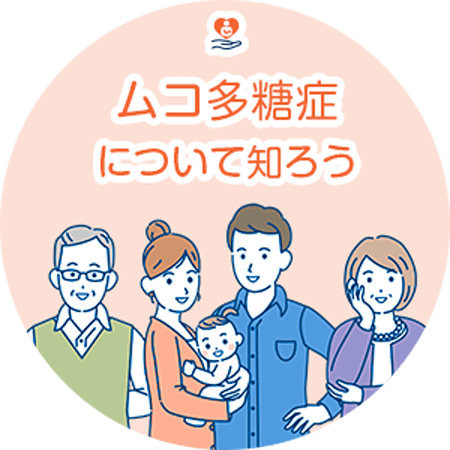To all patients and their families
For To all patients and their families,
Introduces diseases related to BioMarin.
About rare diseases
BioMarin’s mission is to support patients confronting rare diseases, and their families, by delivering the therapies we have pioneered.
What is a rare disease?
Rare diseases are those that affect small numbers of patients.
In Japan, rare disease designation is granted by the Minister of Health, Labour and Welfare to diseases that affect fewer than 50,000 people and meet certain conditions such as high degree of medical need.
For detailed information on rare diseases (orphan diseases), please refer to the Ministry of Health, Labor and Welfare website "Overview of Designation System for Orphan Drugs, Orphan Medical Devices, and Orphan Regenerative Medicine Products".
Getting to know about your disease
This introduction to the diseases that BioMarin focuses on is designed to be easy for patients, their families, and the general public to understand.

 Phenylketonuria
Phenylketonuria
Phenylketonuria(PKU) is a congenital metabolic disorder in which the metabolism of the amino acid phenylalanine (Phe) is congenitally impaired, and phenylalanine (Phe) accumulates in the body, resulting in various symptoms. .

Achondroplasia
Achondroplasia is a disease in which there is an abnormality in the growth process of cartilage cells that form bones, and bone formation is hindered. It is a typical bone disease * characterized by short limbs and short stature.
* Bone system disease: A general term for diseases in which the growth, development, and differentiation of the tissues that make up the skeleton (bone, cartilage, ligaments, etc.) do not go well, causing abnormalities in the formation and maintenance of the skeleton.

Neuronal ceroid lipofuscinosis
This inborn error of metabolism is one of the diseases in the lysosomal storage disease group.
Fourteen types of neuronal ceroid lipofuscinosis (NCL) have been reported, and patients with ceroid lipofuscinosis type 2 (CLN2) account for about 25% of all NCL patients.
Symptoms of CLN2 begin to manifest with delayed speech development around the age of 2 years, and early diagnosis is important because central nervous system symptoms, beginning with uninduced epileptic seizures, rapidly progress.

Mucopolysaccharidosis
It is a congenital metabolic disorder and belongs to a group of diseases called lysosomal storage diseases.
There are 7 types of Mucopolysaccharidosis, and each type has different symptoms.
Short stature, skeletal abnormalities, joint contractures (flax in type IV), and the presence or absence of central nervous system symptoms may suggest the disease.
Since mucopolysaccharide accumulates throughout the body, the symptoms spread throughout the body.

